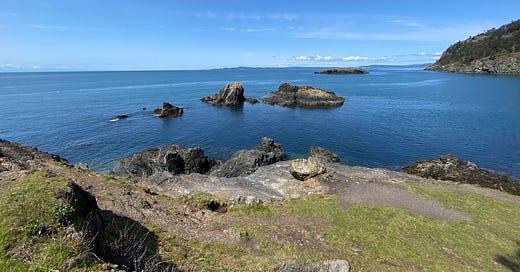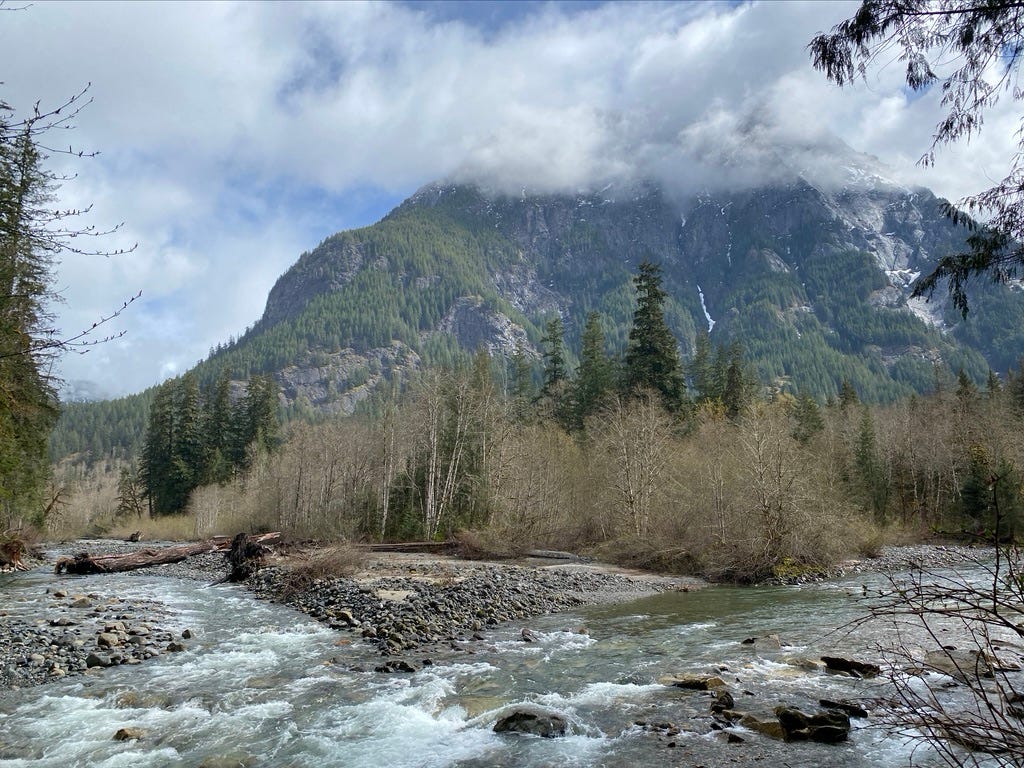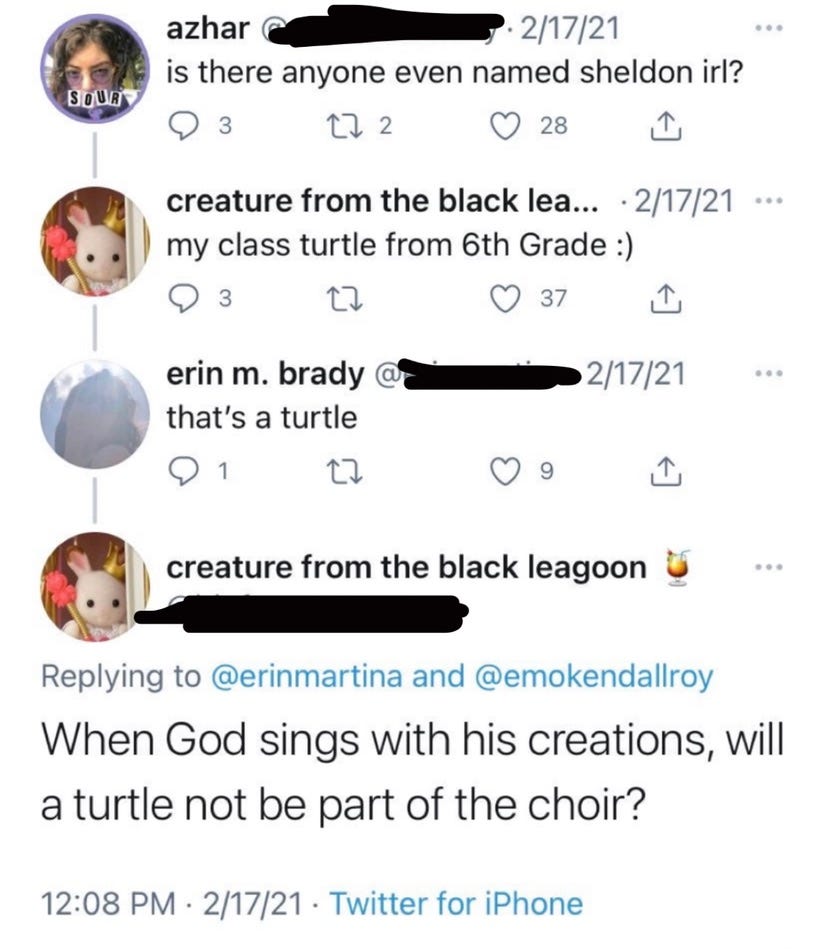It’s been a little over two years since my book, A Good Place for Maniacs: Dispatches from the Pacific Crest Trail came out. While I think it’s important for me to take a moment to celebrate that (And you can, too! Buy the book below), I think it’s also important to reflect on something that I wrote then that I now know to be wrong.
I am frequently incorrect about things but rarely am I glad to be so. This is one of those rare occasions. Back in 2016, when I wrote the bones of my first draft, I said:
All of this—the booming majesty of the mountains and valleys, the dazzling light shows of sunrise and sunset—suggests to me a universe that wants to be paid attention to, one that is on some level aware that by happy accident it has spat out a creature capable of awe commensurate with that which exists to be awed by. I have not heard of elk who can be moved to tears by beauty; I’m not even sure they have tear ducts. I doubt the existence of squirrels or chipmunks who take time to look for shooting stars. It is just us, and that is both thrilling and humbling.
That all certainly felt true in the moment, and I think there’s a lot to be said for working hard to show up and appreciate those rare transcendent moments we’re granted in our short lives. But even if our specific consciousness is unique, well, it came to us from somewhere. It turns out that some animals, especially the ones most closely related to us, seem to experience awe in the same settings we do.
A female barbary macaque monkey named Sylvia stopped feeding, moved to the edge of the cliff, and sat down. Being that she was near the top of the rock of Gibraltar, facing south, the view was amazing. It was “golden hour.”
…For the next few minutes she sat, and I sat with her, transfixed by one of the most awe-inspiring panoramas I (we?) had ever seen.
…Awe is not just for humans. There are reports of wild chimpanzees joining a researcher at sunset, watching rapt as the red orb drops below the horizon and of monkeys sharing moments of what looks like amazement with human observers. Other animals exhibit the outward signs of awe in ways we can measure and identify.
They, and we, seem to experience the possibility of being transfixed in wonder by particularly powerful visual and experiential stimuli.
Is there some evolutionary or biological reason for this ability to experience sublime wonder at things much bigger and more beautiful than we can comprehend? I don’t really care, I’ve discovered.
It is enough to know that I can experience awe, and so can some other beings walking this earth, and that makes me feel more connected to the little guys on the big tree’s other branches. I am not a religious person but I do believe there are things out there that are inexplicable, and will always remain so, and that that’s a good thing; in cases like these I think the more we attempt to quantify and define what’s happening, the more we strip the experience of what made it worth having in the first place.1 I am less interested in why we experience awe than what we do, or don’t do, with it. The choices it might lead us to, the priorities it might instill in us, when we give it the room to do so.
Awe initiated by an avalanche or a lightning strike could have played a role in pushing the imaginations and perceptions that played out in the creation of stone tools or in the experiments with capturing fire. The lasting images of sunsets from coastlines, far-off mountains, volcanic eruptions, and the “movement” of the moon, sun, and stars may have played roles in stimulating the migration across uncharted landscapes by our ancestors. The particulars of human biology, evolutionary histories, and culture combine to offer a distinctive role for awe as a catalyst in acts of creativity, imagination, and change.
The arc of human history is littered with could have and may have and it’s impossible to say exactly what drove our ancient ancestors to do exactly what they did. But we have a pretty good idea, and working backwards from myself to them I feel proud to be part of a lineage of shared awe and wonder. Of a heart made so full by the stars or rivers or canyons or mountains that it feels like it might just burst sometimes.
And who’s to say the awe must come from the transcendantly large, even? There are tiny miracles the world over, too. It’s possible that fungi actually speak to each other, encoding words and phrases on currents of electricity passed between their webbed filaments belowground. If whale songs can move us to tears, why not mushroom songs?
If those ideas are too much, well, there are plenty of animals out there who don’t experience awe, and that’s just fine, too. On Saturday we took our dog with us on an adventure up to, among other places, the tulip fields of Mount Vernon, which paint miles of bright block color on the landscape at this time of year. The waves of red and pink and white and yellow were jaw-dropping, and we oohed and aahed our way around the rows—not through them, like the bunches of would-be influencers were doing in defiance of about a hundred signs—in the spring sunshine. For Orla, our pup, there was no moment of awe, no transfixed stare or soft “Wow…” as she took in the landscape before us. It was simply one more place to sniff and run and bask and trot around with her people. And for her, that’s always been enough. There’s something to be learned from that, too.
Anyway, I hope you can make some space for awe this week. Sometimes these grand and beautiful things are a genuine surprise, and in those cases they are certainly worth noticing and celebrating. But I think awe is also a muscle that can be trained and strengthened. Your mileage may vary but it’s always felt like good exercise to me.
Thanks, as always, for reading. I’ll talk to you next week.
-Chuck
PS - If you liked what you read here, why not subscribe and get this newsletter delivered to your inbox each week? It’s free and always will be, although there is a voluntary paid subscription option if you’d like to support Tabs Open that way.
PPS - If you’re in Seattle or the surrounding areas, I’ll be reading and speaking at Third Place Books in Lake Forest Park on Tuesday 5/31 at 7:00 pm, along with a few other contributors to Crossing Paths: A Pacific Crest Trailside Reader, to celebrate the publication of that anthology. Full event info and tickets below!
Tangentially, this is how I feel about things like gender, too. The millions of Americans who hate and fear trans people find the roots of that hatred, I think, in their inability (and subsequent refusal to try) to understand that life is experienced differently by different people, and there are some things we don’t have to understand about each other as a precondition for affording everyone their due respect and dignity. For my part I’d rather be a happy idiot, glowing with the knowledge of just how much is beyond my comprehension and experience, than a grasping, raging misanthrope lashing out violently in my smallness.







